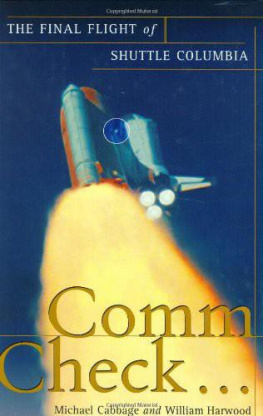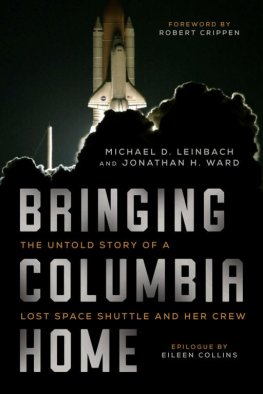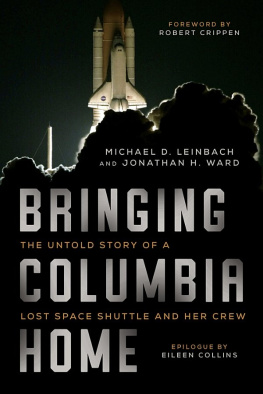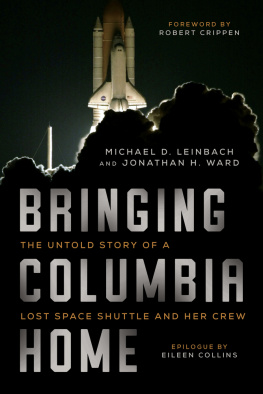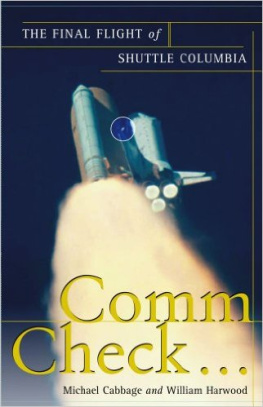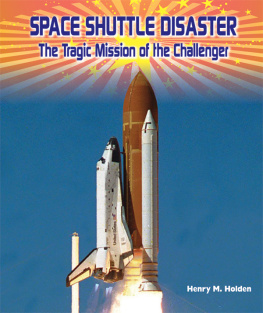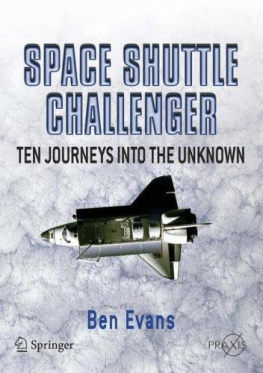Michael Cabbage - Comm Check...: The Final Flight of Shuttle Columbia
Here you can read online Michael Cabbage - Comm Check...: The Final Flight of Shuttle Columbia full text of the book (entire story) in english for free. Download pdf and epub, get meaning, cover and reviews about this ebook. year: 2004, publisher: Free Press, genre: Detective and thriller. Description of the work, (preface) as well as reviews are available. Best literature library LitArk.com created for fans of good reading and offers a wide selection of genres:
Romance novel
Science fiction
Adventure
Detective
Science
History
Home and family
Prose
Art
Politics
Computer
Non-fiction
Religion
Business
Children
Humor
Choose a favorite category and find really read worthwhile books. Enjoy immersion in the world of imagination, feel the emotions of the characters or learn something new for yourself, make an fascinating discovery.
- Book:Comm Check...: The Final Flight of Shuttle Columbia
- Author:
- Publisher:Free Press
- Genre:
- Year:2004
- Rating:5 / 5
- Favourites:Add to favourites
- Your mark:
Comm Check...: The Final Flight of Shuttle Columbia: summary, description and annotation
We offer to read an annotation, description, summary or preface (depends on what the author of the book "Comm Check...: The Final Flight of Shuttle Columbia" wrote himself). If you haven't found the necessary information about the book — write in the comments, we will try to find it.
On February 1, 2003, the unthinkable happened. The space shuttle Columbia disintegrated 37 miles above Texas, seven brave astronauts were killed and Americas space program, always an eyeblink from disaster, suffered its second catastrophic in-flight failure. Unlike the Challenger disaster 17 years earlier, Columbias destruction left the nation one failure away from the potential abandonment of human space exploration. Media coverage in the immediate aftermath focused on the possible cause of the disaster, and on the nations grief. But the full human story, and the shocking details of NASAs crucial mistakes, have never been told -- until now.
Based on dozens of exclusive interviews, never-before-published documents and recordings of key meetings obtained by the authors, Comm Check takes the reader inside the conference rooms and offices where NASAs best and brightest managed the nations multi-billion-dollar shuttle program -- and where they failed to recognize the signs of an impending disaster. It is the story of a space program pushed to the brink of failure by relentless political pressure, shrinking budgets and flawed decision making. The independent investigation into the disaster uncovered why Columbia broke apart in the sky above Texas. Comm Check brings that story to life with the human drama behind the tragedy.
Michael Cabbage and William Harwood, two of Americas most respected space journalists, are veterans of all but a handful of NASAs 113 shuttle missions. Tapping a network of sources and bringing a combined three decades of experience to bear, the authors provide a rare glimpse into NASAs inner circles, chronicling the agencys most devastating failure and the challenges that face NASA as it struggles to return America to space.
About the AuthorSince 1994, Michael Cabbage has reported on more than 40 shuttle missions and covered human spaceflight on three continents. In 1998, he joined the staff of The Orlando Sentinel where he is the newspapers award-winning space editor. He also has served as a space consultant to ABC News. A University of Tennessee graduate, Cabbage earned a masters degree in journalism from Stanford University.
From The Washington PostWhat is it about the space program, anyway? When the Mars Rover began sending pictures to Earth a while ago, the NASA Web site received more than a billion hits within a couple of days. When President Bush wanted to find a national goal that would transcend everyday concerns, he chose returning to the moon. Why, in a time of war and terrorism, are our spirits lifted because a small machine millions of miles away sends back some photographs, or when our political leaders remind us of larger goals?
You wont find much attention to this intriguing question in Comm Check. What you will find instead is a gripping, detailed account of what happens when you try to translate the glowing vision of space exploration into the nuts and bolts of real-world accomplishment. The authors, both veteran reporters on the NASA beat, have taken as their subject the tragic events of Feb. 1, 2003, when the space shuttle Columbia disintegrated as it re-entered the Earths atmosphere over the southwestern United States. Starting with a short description of the horrified silence that fell on the control room in Houston when instruments lost track of the craft, the authors walk us through pre-launch preparations 16 days earlier, the disaster itself and the investigation that followed.
The story is a complicated one, involving a chain of technical and bureaucratic errors. During the launch, some insulating foam came off the external fuel tank and crashed into the leading edge of the crafts wing, opening a hole about a foot wide. The damage couldnt be seen from the spacecraft and wasnt picked up by ground cameras during launch. Higher-level executives ignored warnings from engineers and vetoed requests that damage be assessed by photographs from highly classified military surveillance satellites, although later analysis showed that even if the damage had been documented, nothing could have been done to save the astronauts once they were in orbit.
The authors account is highly readable and largely free of technical jargon. When they introduce a new player, they always give a thumbnail sketch of the persons background to give you a sense of who he or she is. They also include a very useful appendix of acronyms to help the reader deal with NASA-speak, though sometimes the details get a bit overpowering. Closet techno-geeks like me, for example, will be absolutely mesmerized by the second-by-second account of what happened to Columbias left wing as it re-entered the atmosphere, but the eyes of the general reader may well glaze over. Interspersed with the details are some fascinating bits of information. When President Bush was told about the disaster, for example, his first words were Where are the families? -- a reply I took to be a significant insight into the mans value system. Ultimately, the authors give us as complete and readable an account of the Columbia disaster and the inside workings of NASA as we are likely to get.
But in the end, the significance of this book, particularly at this moment, derives from what it has to say about the debate going on in the space program -- the questions of whether we should be sending humans into space at all. As the Columbia disaster shows, this is both risky and expensive. Wouldnt it be better, some argue, to send out (relatively) cheap robots rather than fragile humans to explore the solar system?
I suppose this argument would make sense if the only goal of the space program were to gather data on the planets. But sometimes, when Im in a contemplative mood, I think about humanitys move away from our home planet in a different way. I wonder what history books will say about our generation 500 years from now. In that perspective, the great conflagrations of the 20th century -- even World War II -- will mean no more than the War of the Spanish Succession does to us today. The War on Terror, whether it turns out to be the start of a clash of civilizations or just the dying gasp of a fundamentalist ideology unable to move into the 21st century, will mean no more than the Crusades. In the end, I think, we will be remembered primarily for our many scientific achievements -- splitting the atom, decoding the genome. But most of all, they will say about us, Yes, they were the first people to walk on the moon.
And I want to tell you, my friends, that there are a lot worse things to be remembered for.
Reviewed by James Trefil
Copyright 2004, The Washington Post Co. All Rights Reserved.
Michael Cabbage: author's other books
Who wrote Comm Check...: The Final Flight of Shuttle Columbia? Find out the surname, the name of the author of the book and a list of all author's works by series.

